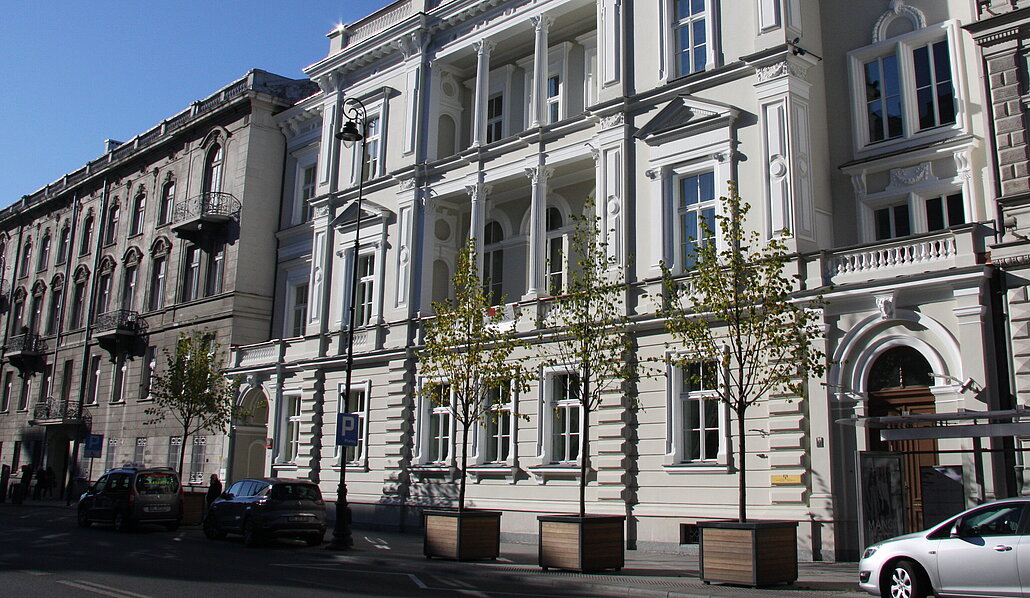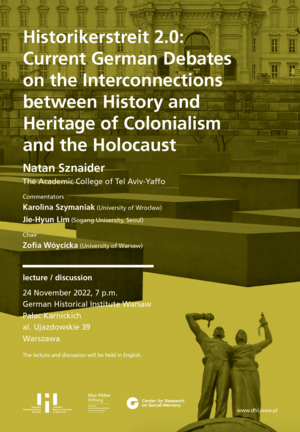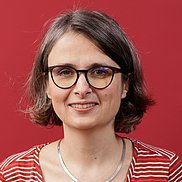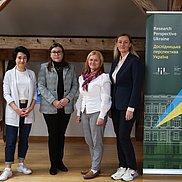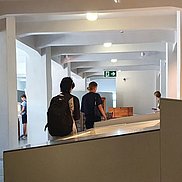Historikerstreit 2.0.: Current German debates on the interconnections between history and heritage of colonialism and the Holocaust
Lecture by prof. Natan Sznaider
Nov. 24, 2022, 7-9 pm
German Historical Institute, Warsaw
Pałac Karnickich
Aleje Ujazdowskie 39
PL-00-540 Warszawa
Commentators:Karolina Szymaniak (University of Wrocław, Jewish Historical Institute)Jie-Hyun Lim (Sogang University, Seul)
Chair:
Zofia Wóycicka, PhD (Centre for Research on Social Memory, University of Warsaw)
The discussion will be held in English.
Description:
In spring 2020 a public debate sparked of in Germany named in reference to the famous dispute of German historians from the 1980s, Historiker*innenstreit 2.0. The debate concerned the relation between colonialism and the Holocaust. Already long before historians have discussed the specificity of the Holocaust in comparison to other genocides and crimes against humanity. They also asked about possible ideological, structural and personal continuities between German colonial rule in Africa before World War I, the Nazi genocide on the European Jews and broader the German occupation in particular of Central-Eastern Europe. However, these disputes had a rather academic character. The actual debate has a much broader reach and thematical scope. It concerns not only historical issues but also current problems, such as the rivalry between the memory of the Holocaust and colonial crimes, the relation between racism and antisemitism and the boundaries between legitimate critique of Israel and antisemitism. An important stimulus for the debate was also the recognition, that Germany has become a multicultural society. This raised the question, whether and how in a society consisting to a great part of people with no family connection to Nazism and World War II, and with a totally different baggage of experience the consensus on the centrality of the Holocaust for the German culture of memory can be upheld.
The newest book by Natan Sznaider "Fluchtpunkte der Erinnerung: Über die Gegenwart von Holocaust und Kolonialismus" (Vanishing Points of Memory: On the Presence of the Holocaust and Colonialism), published beginning of 2022 is an important voice in this debate. In his lecture Sznaider will present the main thesis of his book and share his reflections on the recent developments in Germany. The lecture will be commented by Karolina Szymaniak and Jie-Hyun Lim, who will put these disputes in a Polish and global perspective.
Organizers of the event:
German Historical Institute Warsaw
Centre for Research on Social Memory, University of Warsaw
Natan Sznaider is professor at the Academic College of Tel-Aviv-Yaffo. He has also held visiting professorships at Columbia University in New York, University of Munich, Vienna and Zurich. As a sociologist Sznaider is specializing in Holocaust memory, the sociology of emotions, globalization and the political theory of Hannah Arendt. He developed a sociological theory of cosmopolitanism. He has published 15 books, most prominently Holocaust and Memory in the Global Age (2006) and Human Rights and Memory (2010) [both co-authored with Daniel Levy]. He has also authored over 50 journal essays, among them one which received a price by the British Journal of Sociology as the one of the most important articles of the decade. His most recent book is Fluchtpunkte der Erinnerung: Über die Gegenwart von Holocaust und Kolonialismus (Vanishing Points of Memory: On the Presence of the Holocaust and Colonialism, 2022).
Karolina Szymaniak is assistant professor at the Taube Department of Jewish Studies at the University of Wrocław and a research fellow at the Jewish Historical Institute. The research project focuses on the history of Yiddish-Polish literary and cultural contacts in the 20th and 21st centuries. Her scholarly interests include modern Yiddish literature, the problems of modernism and avant-garde literature written by women, as well as the history and theory of Polish-Jewish cultural contacts. She is also interested in the theory and practice of translation and politics of memory. Szymaniak is a translator of Yiddish literature and lecturer on the Yiddish language, literature, and culture. She authored the monograph “Być agentem wiecznej idei”. Przemiany poglądów estetycznych Debory Vogel („Being an agent of an eternal idea.” The Evolution of Deborah Vogel's aesthetic views, 2006) and the source edition: Rachela Auerbach, Pisma z getta warszawskiego (Rachel Auerbach: Writing from the Warsaw Ghetto, 2015). She is also (co-)editor of several collected volumes and text anthologies and has published numerous articles in peer-reviewed journals and edited volumes.
Jie-Hyun Lim is Professor of Transnational History and director of the Critical Global Studies Institute at Sogang University, Seoul. He is now Principal Investigator of the research project Mnemonic Solidarity: Colonialism, War and Genocide in the Global Memory Space (2017-2024) and Series Editor of “Entangled Memories in the Global South” at Palgrave/Macmillan Publisher. His recent memory studies books include Global Easts: Remembering, Imagining, Practicing (Columbia Univ. Press, 2022). Victimhood Nationalism-A Global History (Humanist, 2021, Japanese translation-2022), Mnemonic Solidarity-Global Interventions (Palgrave, 2021)co-edited with Eve Rosenhaft. As a memory activist, he has been co-curating exhibitions of “Unwelcome Neighbors,” “Naming Forced Laborers” and others.
Dołącz do spotkania Zoom
https://zoom.us/j/94505003561?pwd=YWFVR1ZEd2ZuakFiUTVFVWpDc3VVQT09
Identyfikator spotkania: 945 0500 3561
Kod dostępu: 605700

